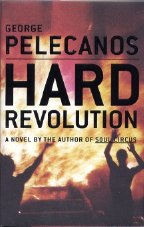Hard Revolution
George P. Pelecanos
Little, Brown / Time Warner
US Hardcover First
ISBN 0-316-60897-1
Publication Date: 03-15-2004
376 Pages; $24.95
Date Reviewed: 03-31-04
Reviewed by: Rick Kleffel © 2004

REFERENCES
COLUMNS
|
|
|
Hard RevolutionGeorge P. PelecanosLittle, Brown / Time WarnerUS Hardcover FirstISBN 0-316-60897-1Publication Date: 03-15-2004376 Pages; $24.95Date Reviewed: 03-31-04Reviewed by: Rick Kleffel © 2004 |
|
|
REFERENCES |
COLUMNS |
Part of the fun of creating a character is creating a life for them outside of the novel. George Pelecanos has been dropping hints about the past of his protagonist Derek Strange over the course of his last three novels, 'Right As Rain', 'Hell to Pay' and 'Soul Circus'. There's been enough said to intrigue and tantalize readers, especially as parts of that past play a pivotal role in the plot points of the current-day novels. 'Hard Revolution' brings that past to life, rewinding the life of Derek Strange back to 1968, when he's a rookie cop walking a beat in Washington DC. It's a clever decision, allowing Pelecanos to assign the complex weave he's already created in the future to a life outside of the current novel set in the past. The result combines period and character details into a seamless weave that unfolds against the backdrop of explosive changes in the American social and political landscape. Pelecanos preserves the balance between a positive vision of his characters and the negative undertow of an economic trap being set by time and circumstance. It's a powerful, profound emotional journey to a pivotal moment in American history.
The novel takes place in 1959, when Derek Strange is a twelve year old boy on the edge of crime and punishment, and in 1968, when he's a 21 year-old rookie cop asked to police his own people. As a boy, Derek finds himself subject to the universal forces of peer pressure, jealousy and his own inclinations, good and bad. The choices he makes lead him to his position in the Washington DC police force. His older brother is not so fortunate. Dennis, a disaffected, disabled Vietnam veteran, falls into a rapidly descending orbit around a small-time gangster, Alvin Jones. Both are powerfully affected by the journey that Martin Luther King, Jr. is making across the American physical and cultural landscape. As the lives of Pelcanos' fictional characters and those of the real figures converge, terrible events will tear those lives asunder.
Pelecanos brings all the skills of characterization he has demonstrated in the current-day Quinn/Strange novels to this tightly written work of historical fiction. He strikes the right balance in all situations between the large-scale historical backdrop and the small-scale character grace notes. Readers will be happy to see that his knack for creating memorable antagonists is as expertly deployed in the past as in the present. Alvin Jones and his white counterpart, Buzz Stewart, are nasty pieces of work that have enough humanity within them to seem fragile and real. Strange's parents are particularly well done. Alethea and Darius Strange have the easy reality of the reader's own parents. Pelecanos crafts their relationship to one another and Dennis and Derek with an expertise that's utterly transparent.
Pelecanos' prose provides the underpinnings that allow this novel to flower in the reader's mind. He's focused on staying out of his own way, on connecting the readers deeply and directly with the characters at hand. There's nary a word wasted and nary a word wanted. It's as if the characters and events were allowed to describe themselves.
Though the novel is set more than 35 years ago the plotting is not unfamiliar to Pelecanos readers. That's because the writer focuses on universal human themes and experiences, not the plot point du jour. What's different here is the place of the historical events. Pelecanos relates these in the same limpid prose that he applies to his created characters. There's a certain reportorial feel to the novel, as events culminate in the horrific riots that shook Washington and gave many a man the opportunity to unleash demons that would have been better left imprisoned.
Readers of Pelecanos oeuvre will have a field day with all the appearances by characters who appear in other novels, spotting the events that have been referred to in brief in their fleshed out form. Pelecanos is clearly having fun himself, and it's infectious. He's having so much fun that he's included a CD with the book. They call it a soundtrack, and that may be the case, though in that case, I'd call it a "Soundtrack From..." the book as opposed to a "Soundtrack to..." the book. By that I mean that the music on the CD is music that the characters in the novel listen to. It's a selection of high-class vocal soul and pop music from the time, trending towards the romantic, and would certainly serve well as "make out music". Every tune on the CD plays a part in the novel. However, since the music is all vocal, it's rather distracting to listen to if you're trying to read the novel; at least that's my take. A better soundtrack to the novel might be some of Strange's beloved Ennio Morricone music. There is not shortage of western-style vibes in the timeless macho relationships that Pelecanos so perfectly portrays.
For a novel of crime fiction, there's an awful lot of positive, loving tenderness in 'Hard Revolution', as well as the requisite cold-hearted killings. In the end, while the tension, threats and violence propel the story, the easy-going optimism and the quiet power of family bonds are what stand out in the reader's memory. 'Hard Revolution' is easy to like and hard to forget.